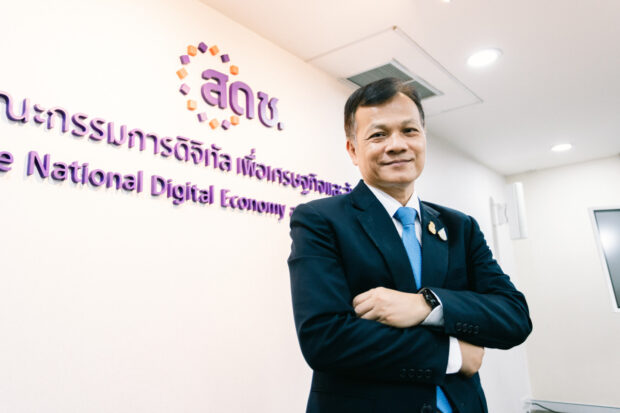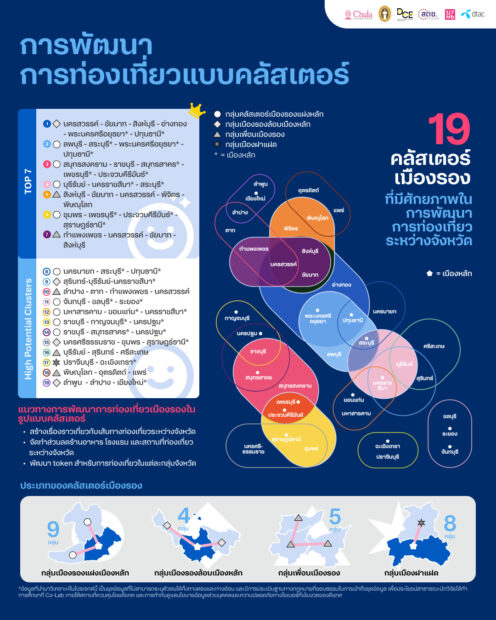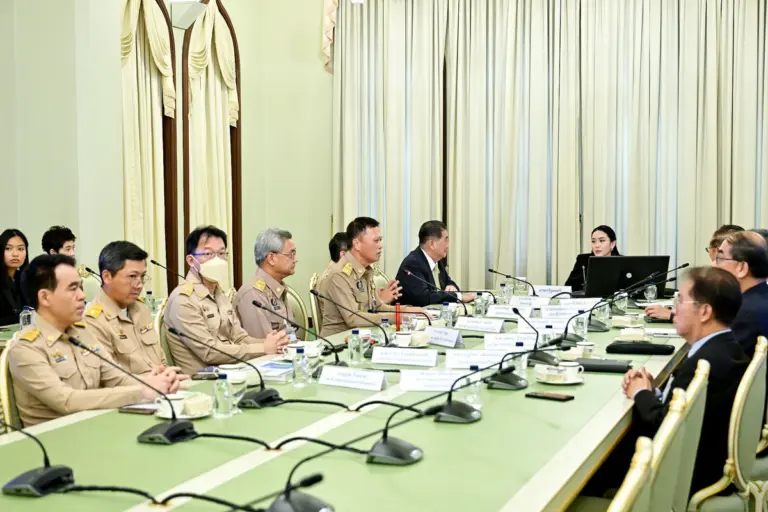
ผศ.ดร.ณัฐพงศ์ พันธ์น้อย อาจารย์ประจำภาควิชาการวางแผนภาคและเมือง คณะสถาปัตยกรรมศาสตร์ จุฬาลงกรณ์มหาวิทยาลัย
ด้วยการเปลี่ยนผ่านสู่สังคมดิจิทัลเต็มรูปแบบ ทำให้สภาพแวดล้อมทางสังคมเปลี่ยนไปอย่างรวดเร็ว ภาคเอกชนมีการนำข้อมูลบิ๊กดาต้ามาใช้ประโยชน์เชิงพาณิชย์อย่างแพร่หลาย ขณะที่ภาครัฐในหลายประเทศได้มีการอภิปรายถึงแนวทางการนำ “บิ๊กดาต้า” มาใช้ประโยชน์เพื่อต่อการออกแบบนโยบายสาธารณะ
ผศ.ดร.ณัฐพงศ์ พันธ์น้อย อาจารย์ประจำภาควิชาการวางแผนภาคและเมือง คณะสถาปัตยกรรมศาสตร์ จุฬาลงกรณ์มหาวิทยาลัย บอกว่า ในต่างประเทศเริ่มมีข้อถกเถียงและการอภิปรายถึงประเด็นการใช้ mobility data มาเป็นแนวทางในการพัฒนานโยบาย ตัวอย่างเช่นในนอร์เวย์ สวีเดน ฝรั่งเศส สโลวาเกีย ที่มีการนำ mobility data มาวิเคราะห์รูปแบบการเดินทางของนักท่องเที่ยวเพื่อการออกแบบยุทธศาสตร์การท่องเที่ยว เช่นเดียวกับการดำเนินการวิเคราะห์ mobility data ร่วมกันระหว่างดีแทค คณะสถาปัตยกรรมศาสตร์ จุฬาฯ และบุญมีแล็บในครั้งนี้ ซึ่งแสดงให้เห็นถึงอานุภาพของข้อมูล Mobility data ต่อการออกแบบนโยบายสาธารณะที่มีข้อได้เปรียบด้านขนาดข้อมูล ความรวดเร็วในการรวบรวมข้อมูล ต้นทุนที่น้อยกว่าการได้มาซึ่งข้อมูลแบบสำรวจ หากเราสามารถนำ mobility data มาใช้ในการออกแบบนโยบายได้มากขึ้น จะสร้างพลังขับเคลื่อนอันมหาศาลในการสร้างนวัตกรรมเพื่อการพัฒนาอย่างยั่งยืนทั้งในด้านเศรษฐกิจ สังคม และสิ่งแวดล้อม
“mobility data ไม่เพียงแต่จะทำให้ภาครัฐและนักวิจัยเข้าใจสถานการณ์ในสังคมได้ดีละเอียด ชัดเจน และฉับไวมากขึ้น หากภาคประชาชน ชุมชน และผู้ประกอบการรายย่อยสามารถเข้าถึงข้อมูลได้จะเป็นการเปิดโอกาสให้สังคมมีทางออกใหม่ให้กับปัญหาต่างๆ ที่เกิดขึ้น” ผศ.ดร.ณัฐพงศ์ กล่าว
เวลา: ตัวแปรสำคัญของการพัฒนา
ฐิติพงษ์ เหลืองอรุณเลิศ ซีอีโอของ Boonmee Lab บอกว่า บริษัทมีเป้าหมายในการนำความรู้ด้านการออกแบบ ดาต้า และเทคโนโลยีมาทำให้เกิดนวัตกรรมเพื่อสังคม และโปรเจ็คนี้ก็เป็นหนึ่งในโปรเจ็คที่ตื่นเต้นที่สุดด้วยลักษณะของ mobility data ที่มีลักษณะเฉพาะ ประกอบกับการมองเห็นถึงศักยภาพในการออกแบบนโยบายสาธารณะที่แม่นยำและมีประสิทธิภาพ
“โปรเจ็คนี้อาจเรียกได้ว่าเป็นการนำ mobility data มาวิเคราะห์และนำไปสู่ข้อเสนอแนะเชิงนโยบายครั้งแรกของไทย และสามารถต่อยอดไปสู่การกำหนดนโยบายสาธารณะเพิ่มเติม นำมาพลิกแพลงได้หลายอย่างจนนำไปสู่ข้อสรุปใหม่ที่เป็นประโยชน์ต่อสังคม” ฐิติพงษ์กล่าว
ในโลกสมัยใหม่ที่ดิจิทัลได้เปลี่ยนแปลงกระบวนทัศน์และองคาพยพของสังคมอย่างสิ้นเชิง การออกแบบนโยบายสาธารณะก็ควรมีการปรับเปลี่ยนเพื่อให้เท่าทันกับการเปลี่ยนแปลงที่เร็วขึ้นของสังคม ควรนำแนวคิดการทำงานแบบ agile มาใช้ เพราะหากรัฐยังมีมุมมองต่อนโยบายสาธารณะแบบเดิม ในห้วงระยะเวลา 10 ปีต่อจากนี้ ประเทศไทยจะตามหลังนานาอารยะประเทศอย่างมาก
“ในยุคที่เวลาเป็นทรัพยากรที่มีค่า ภาครัฐจำเป็นต้องนำเครื่องมือและรูปแบบการทำงานสมัยใหม่มาใช้ให้เกิดประสิทธิภาพ อย่างเช่นโปรเจ็คนี้ที่คาดหวังว่าจะเป็น use case ของการนำ mobility data มาเป็นฐานเพื่อหนดนโยบายอื่นๆ ต่อไป” ฐิติพงษ์กล่าว
พร้อมเน้นย้ำโดยยกตัวอย่างกรณีการกำหนดเส้นทางเดินสายรถเมล์ที่อาจใช้ mobility data ร่วมกับข้อมูล CCTV ทำให้ระบบขนส่งมวลชนของกรุงเทพฯ มีประสิทธิภาพมากขึ้น
พันธกิจแรกเพื่อการเชื่อมโยงข้อมูลภาครัฐ
ภุชพงค์ โนดไธสง เลขาธิการสำนักงานคณะกรรมการดิจิทัลเพื่อเศรษฐกิจและสังคมแห่งชาติ (สดช.) กระทรวงดิจิทัลเพื่อเศรษฐกิจและสังคม อธิบายว่า นับตั้งแต่การเปลี่ยนชื่อจากกระทรวงเทคโนโลยีสารสนเทศและการสื่อสารมาเป็นกระทรวงดิจิทัลเพื่อเศรษฐกิจและสังคมแห่งชาติของรัฐบาลสะท้อนให้แห็นถึงการเปลี่ยนกระบวนทัศน์ต่อการพัฒนาสู่ Digital Nation โดยให้ความสำคัญที่ “ข้อมูล” มากกว่า “ระบบไอที”
ปัจจุบัน สดช. ได้กำหนดทิศทางด้านข้อมูลโดยผลักดันให้ฐานข้อมูลที่เป็นบิ๊กดาต้าเป็นแหล่งเดียวกัน ภาครัฐเองยังเผชิญกับความท้าทายโดยเฉพาะระบบการได้มาและการจัดเก็บข้อมูลนั้นมีความแตกต่าง ซึ่งแต่ละหน่วยงานมีการจัดเก็บข้อมูลของตัวเอง โดยทั้งหมดต้องคำนึงถึงนโยบายคุ้มครองข้อมูลส่วนบุคคล อย่างไรก็ตาม ท่ามกลางสภาพเศรษฐกิจและสังคมที่เปลี่ยนไปอย่างรวดเร็ว การออกแบบนโยบายจำต้องให้ทันสถานการณ์ ดังนั้น ปฏิเสธไม่ได้ว่าการได้มาซึ่งข้อมูลที่ทันการณ์จึงความสำคัญมาก
“ในฐานะที่เคยดำรงตำแหน่งผู้อำนวยการสำนักสถิติแห่งชาติ ผมตระหนักดีถึงบทบาทและความสำคัญของข้อมูล โดยเฉพาะอย่างยิ่งหากข้อมูลมีการบูรณาการจากหลายแหล่ง วิเคราะห์ได้ถูกจุด ก็จะทำให้ข้อมูลนั้นๆ มีพลังอย่างมาก” เลขาธิการ สดช. กล่าว
ที่ผ่านมา แม้การเชื่อมโยงข้อมูลภาครัฐยังเผชิญกับความล่าช้าอันเนื่องมาจากการปรับปรุงกฎหมาย แต่ขณะเดียวกัน รัฐเองก็มีความพยายามอย่างต่อเนื่องในการปฏิรูปข้อมูล ทั้งการจัดเก็บในรูปแบบดิจิทัลบนระบบคลาวด์ที่สำนักงานพัฒนารัฐบาลดิจิทัล (องค์การมหาชน) เป็นเจ้าภาพ หรือการจัดตั้งสถาบันส่งเสริมการวิเคราะห์และบริหารข้อมูลขนาดใหญ่ภาครัฐ (สวข.) ซึ่งเป็นหน่วยงานเต็มไปด้วยบุคลากรด้าน data scientist เพื่ออำนวยความสะดวกวิเคราะห์ข้อมูลตามโจทย์ที่หน่วยงานรัฐต่างๆ ต้องการ
“ข้อมูลที่เรียลไทม์จะทำให้ภาครัฐสามารถบริหารจัดการปัญหาต่างๆ ได้รวดเร็วและมีประสิทธิภาพมากขึ้น เช่น การบริหารจัดการน้ำ การรับมือกับภัยพิบัติ เป็นต้น อย่างไรก็ตาม เป้าหมายสำคัญในระยะอันใกล้นี้คือการเชื่อมโยงฐานข้อมูลให้เป็นแหล่งเดียวกัน ซึ่งเป็นการกลัดกระดุมเม็ดแรกที่มีความสำคัญอย่างมาก” นายภุชพงค์ กล่าว
ก้าวสู่ความเป็นไปได้ใหม่ๆ
อรอุมา ฤกษ์พัฒนาพิพัฒน์ ผู้อำนวยการอาวุโส สายงานสื่อสารองค์กรและการพัฒนาที่ยั่งยืน กล่าวว่า จุดยืนของดีแทคต่อการใช้ mobility data คือ การขยายความเป็นไปได้ใหม่ๆ ที่อยู่บนสมดุลระหว่างนโยบายความเป็นส่วนตัวกับประโยชน์สาธารณะ เพื่อสนับสนุนและส่งเสริมสังคมเละเศรษฐกิจดิจิทัลให้เกิดขึ้นอย่างเป็นรูปแบบอย่างแท้จริง
อรอุมา กล่าวเสริมว่า แม้โครงการฯ นี้จะใช้เวลายาวนานถึง 2 ปี แต่ทีมงานทั้ง 3 ฝ่ายก็ทำมันสำเร็จ แต่นั่นเป็นก้าวแรกเท่านั้น โดยก้าวต่อไปคือ การได้รับความเห็นชอบโดยหน่วยงานที่รับผิดชอบและนำข้อเสนอแนะเชิงนโยบายจากงานวิจัยไปปรับใช้ ส่วนปลายทางความสำเร็จคือ การเห็นผลลัพธ์อย่างเป็นรูปธรรมต่อเศรษฐกิจและสังคมของประเทศ เพื่อเป็นการพิสูจน์ให้เห็นถึงวิธีการใช้ข้อมูลและวิธีการใหม่ๆ ในการแก้ไขปัญหาสังคม เช่นเดียวกับกรณีนี้ ที่มีความคาดหวังให้ mobility data สามารถเปลี่ยนแปลงโครงสร้างการท่องเที่ยว ตลอดจนเพิ่มการมีส่วนร่วมขององค์กรส่วนท้องถิ่น
“หลายคนอาจถามว่าเอกชนจะก้าวขามาเกี่ยวข้องกับเรื่องนโยบายสาธารณะทำไม แต่ดีแทคเราเชื่อว่า สิ่งนี้คือหน้าที่ของผู้ให้บริการโทรคมนาคมด้วยการใช้ศักยภาพของ mobility data ผ่านความร่วมมือระหว่างภาครัฐ เอกชนและสถาบันการศึกษาสร้างประโยชน์ต่อประเทศตามแนวคิด Civil society” อรอุมา อธิบาย
………….
How mobility data can improve public policymaking for tourism promotion in second-tier provinces
The transition into a digital society has rapidly changed the social landscape, with the private sector actively using big data for commercial purposes. Many governments are discussing how to apply big data in a similar manner for the formulation of public policies.
According to Asst. Prof. Dr. Nattapong Punnoi, a lecturer at the Department of Urban and Regional Planning of Chulalongkorn University’s Faculty of Architecture, there are widespread debates on the use of big data for policy formulation in many countries. Norway, Sweden, France, and Slovakia, for example, use mobility data to analyze travel patterns to develop tourism strategies.
Likewise, the collaboration between dtac, Chulalongkorn University’s Faculty of Architecture, and Boonmee Lab also reveals the potential of mobility data in public-policy formulation. When compared with data from surveys, mobility data is much more extensive and the process of data collection is much more cost and time efficient. If used in policymaking, mobility data can drive massive impacts and innovations for sustainable economic, social and environmental development.
“Access to mobility data does not just allow the public sector and researchers to better understand social circumstances in a timely manner, but it also enables civil society, communities, and small-scale business owners to be more data driven in making a decision and finding solutions,” Asst. Prof. Dr. Nattapong said.
Time: Key Development Factor
“We hope to leverage our knowledge in data design and technology to drive social innovations,” Thiti Luangarun, Co-founder of Boonmee Lab said, “Mobility data are unique. This is why the Phatthalung Project is an exciting initiative. We also see high potential of using mobility data to design more accurate and efficient public policies.”
“This project probably marks the first time mobility data are analyzed for policy recommendations in Thailand. We can build from this to design data-driven public policies that can be applied to many other aspects for social good,” he continued.
Society is experiencing a paradigm shift and transformative change driven by digital technologies. Public-policy formulation, therefore, should keep pace with this. Agile approaches must be used for the formulation of public policies. If the public sector continues to use existing approaches to public policy development, in the next 10 years Thailand will significantly lag behind other countries.
“Time is a precious resource. The government must embrace new tools and ways of work for maximum efficiency. Our project is a use case of how mobility data can support policymaking,” Mr. Thiti explained and cited an example of how mobility data can be paired with CCTV footage data to structure more efficient bus routes.
Mission to Integrate Government Data
Putchapong Nodthaisong, secretary-general of Office of the National Digital Economy and Society Commission, the Ministry of Digital Economy and Society (MDES), said after the Ministry of Information and Communication Technology was renamed the Ministry of Digital Economy and Society, it was clear that Thailand was serious about embarking on its transformation into a digital nation with data becoming more important than IT infrastructure.
The Office of the National Digital Economy and Society Commission is pushing for a centralized database of big data. However, the plan has met with several challenges, as each government agency uses a different method to acquire and store data. Data privacy concerns also need to be addressed. Still, in the face of a fast-changing economic and social context, public-policy formulation and data acquisition must be agile and timely.
“As a former director of the National Statistical Office, I am well aware of the importance of data. If data from various sources are integrated and analyzed properly, they can be extremely useful,” the head of ONDE said.
Although data integration of the public sector has faced several delays due to changes in law and regulations, the government has been pushing for data reform. For instance, government data have now been compiled on a Cloud system hosted by the Digital Government Development Agency. The Government Big Data Institute has also been established. Backed by data scientists, the institute has the mission of analyzing big data to support government operations.
“Real-time data will enable the government to manage issues such as natural disasters and water management more effectively,” Mr. Putchapong said. “But the short-term goal for us is to integrate government data in the same database. This is the first crucial step.”
Stepping into New Possibilities
“dtac’s stance is to leverage mobility data to create new possibilities in hopes of promoting a digital economy and society, while also striking the right balance between individual and public interests,” On-uma Rerkpattanapipat, Head of Communication & Sustainability at dtac, said.
According to Ms. On-uma, although the study took more than two years to complete, the three partners eventually made it happen. But this is only the first milestone – the team still needs to win approval from public authorities in applying the policy recommendations from the study. The final output will then materialize in the form of tangible economic and social benefits for Thailand, which demonstrate how social problems can be solved with a novel, data-driven approach. On its part, the Phatthalung Project aims to rebuild Thailand’s tourism and promote participation of local government agencies with mobility data.
“Some people may wonder why dtac, which is from the private sector, steps into the area of public policy,” Ms. On-uma said. “As a mobile operator, we believe that it’s our role to leverage the power of mobility data by collaborating with government agencies, the private sector, and the civil society including educational institutions, to create social good.”










